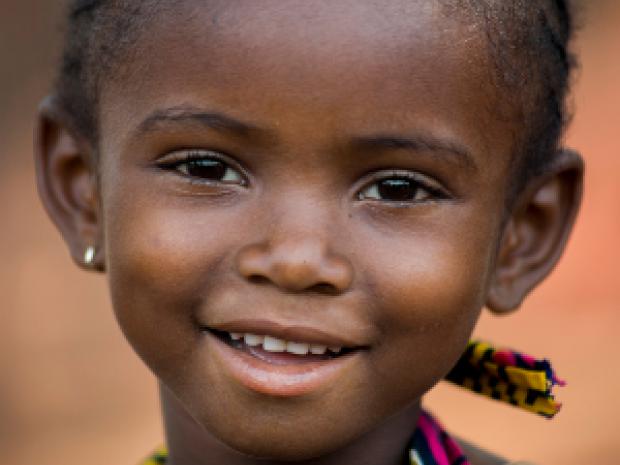How can a simple bucket protect women and girls from sexual violence in the Central African Republic? For women talking to the International Rescue Committee, buckets are an essential part of the “dignity kits” they receive in displacement camps so they can avoid the perilous walk to communal bathrooms after dark.
“Women have now adopted a protection mechanism by which they use these buckets to go to the toilet, instead of going outside at night,” said Christian Lubanzadio, a coordinator for the IRC’s women’s protection and empowerment programme in CAR. “That reduces the risks to which these women are exposed.”
The IRC has so far distributed 9000 dignity kits, which also include cloth, sanitary items, soap and shoes. Complete kits cost about $50, but limited funding means simplified kits for half the price are often distributed.
Catherine Poulton, a women’s protection empowerment technical advisor with the IRC, said while it has been heartening to see donors’ commitment to CAR, more needs to be done to ensure funds are targeted specifically at women and girls.
In particular, she said it had been difficult to finance partnerships with local women’s support groups, which are wrongly perceived only as a long-term investment.

“They are tiny partnerships – we’re talking $2000 per organisation for nine months or a year,” Ms Poulton said. “But there is this idea that if you’re working with community-based organisations that’s development, that’s not emergency [assistance]. And yet we are losing real opportunities of [...] building the skills of people who are there. And at night we might not be there [...] but the women’s groups will still be there, so they could provide emergency counselling.”
Women and girls continue to face a number of risks in the conflict, including:
-Armed groups present in some shelters
-Lack of secure hygiene facilities, and
-The need to engage in ‘survival sex’ to provide for their families.
Dignity kits were not the only example of solutions designed to stop violence against women. The distribution of 200 fuel-efficient stoves by the IRC halved the time women were forced to spend looking for firewood, often in isolated areas that increase the risks they face. More information on threats posed by a lack of clean water is available here.
Experience has taught that as more support services become available, more people feel able to report attacks. Within four months, 619 women reported gender-based violence to IRC Women’s Centres in Bangui, Kaga-Bandoro and Bocaranga, with almost half saying they had been gang raped.
Agnes Djamndo, vice-president of the Women’s Leadership Network of Kaga-Bandoro and herself a survivor of rape and president of the Network for People Living with HIV/AIDS, said the lack of effective law enforcement dissuaded victims from reporting attacks.
“They rape you in front of your family, in front of the public...” she said. “We want to complain, we have our right to complain so that there are punishments. If these people are prosecuted maybe they will be punished and stop their violence against women. But as there are no such structures we are left to fend for ourselves.”
Women are the head of one-in-three households in CAR, with the men often having fled or joined the fighting.
Roughly half a million people – 13 percent of the population – have been internally displaced by the conflict, but those in camps are far from safe.
“Women live in difficult conditions in displacement camps,” Mr Lubanzadio said. “Five or six families might live in the same tent, so this poses questions about proximity and women’s privacy.”
According to the IRC, just 19 of 44 displacement camps in the capital Bangui receive services and awareness efforts focused on gender-based violence.
The organisation is now in the process of sending mobile clinics to remote areas of the large country, roughly the same size as France but with just 4.5 million inhabitants.
Ms Djamndo related how roaming bands of armed groups often make it impossible to move further than a few kilometres. Yet after a woman is raped she has only a few hours to prevent life-threatening injuries from becoming fatal, three days to prevent transmission of HIV, and one-week to prevent an unwanted pregnancy.
Those providing assistance may be targeted as well. In April this year at least 22 people, including 15 local leaders and three staff members from Médecins Sans Frontières, were killed in an attack by Seleka rebels in Nanga Boguila, about 450 kilometres north of Bangui.
“My office has been visited numerous times by armed groups and they’ve taken money and vehicles,” Mr Lubanzadio said. “So there must be security as soon as possible to allow those we are helping to access our services.”
|
Through EuropeAid, the European Commission is now preparing an additional €134 million in funding to CAR:
This comes on top of the more than €100m the EU and member states have contributed to CAR for security and humanitarian aid in the past two years. The EU has also maintained a political dialogue with the government of President Catherine Samba-Panza to try to promote reconciliation and end the conflict with Seleka rebels and anti-Balaka groups. |
This article is based on an Info Point presentation featuring the IRC, held in Brussels on May 26, 2014.
This collaborative piece was drafted with input from Yves Picaud (EuropeAid) and Catherine Poulton (IRC), with support from the capacity4dev.eu Coordination Team. Photos courtesy of IRC.



Log in with your EU Login account to post or comment on the platform.